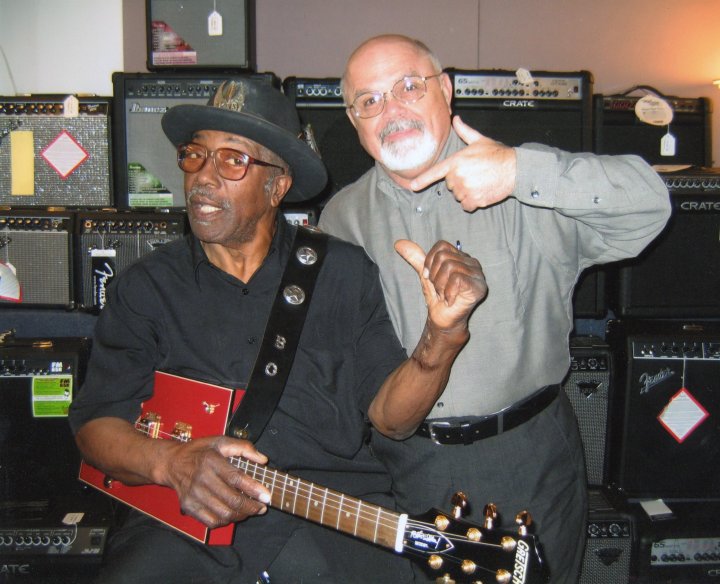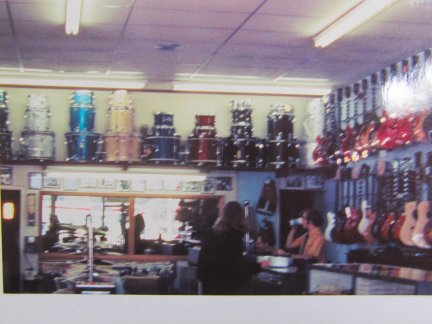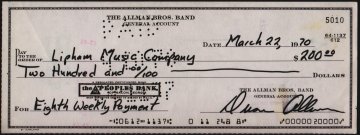“Things Were Really Rolling Back Then”
Interviewed 2/27/2012

“Things Were Really Rolling Back Then”

A resident of Gainesville since 1955, Buster Lipham took his father’s business and turned it into one of the biggest music stores in the South. In doing so he created a social space for a community of local and regional musicians, an informal meeting place. Buster, a very social and sociable man, did business and friendship with musicians in all genres, from Shot Jackson, co-inventor of the Sho-Bud steel guitar, to the Allman Brothers, The Royal Guardsmen,and dozens of bands from around Florida and the South. With longtime franchises on all the major music brands, a personable business approach and generous credit payment plans, Buster made it possible for Gainesville musicians to be playing on top gear, as the photos of local bands from the ‘60s will attest. It was a time and a place to be a musician—and a music retailer--and during the ‘60s and ‘70s the place to shop was Lipham’s.
I was born in El Paso, Texas. My father was born in Georgia on a piece of land given as a grant to my great grandfather who fought in the Civil War, he fought gallantly and won a lot of battles and they couldn’t pay him so they gave him some land in Georgia, and there’s a Primitive Baptist Church on that land that he established in the 1800s.
During the Depression my grandfather got worried so he moved six miles across the Tallapoosa River into Alabama because he heard it was better over there. But it got worse so he put twelve kids on a train, rode three nights to Colorado City, Texas; got off the train at 4:30 in the morning; had breakfast at 5:00 in the morning, and they were picking cotton by six in the morning.
And that’s where my father [Theron Velford Lipham] lived until he met my mother, who was one of the young ladies who served him food that morning, and three years later they were married, in 1939, in Albuquerque, New Mexico, they eloped. I was born in 1943, in El Paso, my father worked for a refrigeration company, then we moved to San Antonio, Texas, and then to Kermit, Texas, to Grand Falls, then to Midland, my father worked for Wimple Music there, and was requested to go to the trade show in Chicago. He met Mr. Gridley there, who owned many music stores in the South. Mr. Gridley said, “I have a son who is worthless, and I don’t want him involved in my stores, would you like to buy them and run them?” My father said he had no money to buy the stores but Mr. Gridley told him he could buy them on time…through payments. He had stores in Tallahassee, Thomasville [Georgia], Valdosta, Ocala and Gainesville. He says, “What do you think?” Dad said, “I’ll think it over.”
We went back home, and my father said, “O.K., we’re moving to Florida,” and I said, “Where’s Florida?” I remember driving out as a kid to Florida and seeing trees. Now, in Texas, we had mesquites, which were bushes with thorns in them, and I thought, why are all the trees in Florida?
We borrowed a trailer from my uncle, who was a cotton farmer, and loaded everything we had in it, and headed for Tallahassee. I remember at the age of twelve, sitting in the car with a pillow under me and two pillows behind me, so I could reach the gas pedal, and driving my father, because he, never having owned a business, wanted to make sure he was on top of everything, so he would go to a different store every day, rotating. In the summer I would become his helper and chauffeur. I remember my mom saying one morning, “This is the last day your son is going with you, because you’re going to make a decision, decide on one store that you like and sell the rest of them, or you’re going to find another wife!” For me it was fun, this was in ’55, ’56. It took a while to sell the other stores but he did. We moved to Gainesville in 1954. I graduated GHS in 1961. When I was 14 I was helping deliver pianos and when I was old enough to drive I was doing that.
My father agreed to leave the name of the store as Gridley’s for a while as part of the sales agreement.
That was a beautiful time. The Beatles made rock ‘n’ roll happen for everybody. Everybody was going to be a star. We had more garage bands than you could shake a stick at. Farfisa Combo Compact Deluxe, Hofner bass, and Rickenbackers were just selling like crazy. It was 1967 when Tom Petty was working for us…everybody hung out at the store on Saturdays…

[looking at a photo of the inside of the store at 1004 N. Main] This is a typical shot of the old store, of the wall behind the counter…[pointing to each guitar] [Gibson] SG, SG, SG, SG, SG, Les Paul, Les Paul, Les Paul, Paisley Strat, Les Paul, SG Custom, Melody Maker, SG, Fender Jaguar, Strat, Strat, Strat, Strat, Martin, Martin, Martin, Martin.
I sold the Gretsch White Falcon [Gretsch’s top model] to a young man in Trenton, Florida and his father sold his farm, moved to Nashville and the kid became a globally famous artist named Tommy Jones, Chet Atkins was teaching him and said son, I can’t teach you any more, you’re better than I am. The young man destroyed his life…he drank himself to death.
I had a deal with bands. I said, guys, if you buy your equipment from me, and you buy a van or a trailer, I’ll pay to have it lettered with your band name, as long as I can add “Equipped by Lipham’s,” because they did buy their gear from me.
[looking at some photos from the ‘60s] We did a lot of bluegrass weekends. We were gonna have it out on that flatbed but it rained that day so we just had it inside. Notice the cowboy ties? This is Shot Jackson [invented the Sho-Bud steel guitar], this is Donna Darlene, and this is Chuck Thompson [played guitar on recording of “Smoke, Smoke, Smoke That Cigarette”]. Shot Jackson played a number of weekends. There’s Lester Flatt [of Flatt & Scruggs]. I got to meet him at a Gibson show, in ’69, that was fun. Really nice gentleman, about as nice as the day is long.
Back then we had everything: Gibson, Martin, Fender, Mosrite, Baldwin, we had Rickenbacker, Goya, sold a ton of Gianninis. Amps…Remember the Electrovoice Eliminator? The Baldwin Destroyer? Baldwin, the piano company, made an amp about this big [holds hand at shoulder level], I think we ordered one of those: it was a piece of junk. We had Baldwin guitars, they didn’t sell. Mosrites were known to have a great neck but they tended to go South on you because they were so small.
Did I consciously work to build the store bigger? Well, it’s really simple, the same as made this planet since the day the first guy grew his first apple: supply and demand. You don’t make people want things; people want things and you offer them, you make them available. Gibson SGs and Les Pauls were just total winners. Who made the Rickenbacker famous? The Beatles. Who made the Gretsch famous? The Beatles.
We had something back then you don’t find today, we had personal integrity and we had honor. Greg McMillan came into the store and he wanted a bass. He was a little punk kid. His father owned a restaurant. My father knew his father. We knew that if Greg didn’t pay, we’d pick up the phone and say hey Mac, but Greg was honorable. Tom [Petty] would take stuff home.
We let the one armed guitar player, S.J. Hall take home guitars. Gibson came out with a 345 stereo guitar. S.J. kind of liked it, but didn’t know if he wanted it or not, and he liked a 335 too, so my father handed him both and S.J. drives home 48 miles with the guitars. He called Monday and said he couldn’t make a decision, and my father said just keep them a few more days. So then the guy says Mr. Lipham I don’t know what to do, I want both of them. So my father worked it out and S. J. still has both guitars.
You can’t do that today. I let a guitar out that door today without being paid for I never see it again and I have to chase that guy. S.J. was from Trenton, he still owns two Twin Reverbs he bought from us back in the ‘70s, brought one in about three or four years ago and said, I finally have a bad tube. They were American-made tubes so they lasted forever. People just don’t have any integrity and honor any more, it’s gone.
The bands manager, Roy Morris, was pretty slick. He was in the store a lot. He had two Styrophoam Soules, Roy would book the band in two different places on the same date and suddenly there would appear two Styrophoam Soules. He had two bands so he needed a lot of musicians, he was probably the most prolific booker at the time. He had that band cooking, and staying busy.
Did I ever feel competition from other stores? We’ve probably had sixteen music stores move in and out of Gainesville during our 58 years. Marvin Kaye’s…Marvin Kaye was a pawnshop broker who got in the music business, and he came down and ran it like a pawnshop. He left, and Mr. Nice came down, he had about fourteen stores in Florida, and he came in and was gonna break Gainesville out, moved into the space, he guy came down from Jacksonville, he was going to clean our clock, big talker, and he opened up there.
The Second Coming [with guitarist Dicky Betts and bassist Berry Oakley] would come and play at The Place, and they came into the store and we met. You know how you sometimes meet someone and just know they’re going to be a friend? That’s what happened. Berry came in and we became friends and he introduced me to Greg Allman, this was about 1968. The Allman Brothers formed soon after that.
How I got involved with them? We became first of all friends, and second of all it was easy, they needed gear, they played a lot and were in and out of the store a lot, if they had a need we’d just fulfill it, about that time we had the Royal Guardsmen [Snoopy vs. The Red Baron] going, and Ron and the Starfires, and the Nation Rocking Shadows…
It wasn’t business, it was a friendship. I got a call once from the Allman Brothers, about 2:30 in the morning, and they said Buster, we’re on our way down to Criteria Recording in Miami, we need some stuff, and I said I’d meet them at the store, I went down there and helped them with their needs and they went on their way. It was a friendship and it was business. And they introduced me to Tony Joe White, and I sold him some stuff, and also Dr. John.

I had sold Dicky a Fender Twin, and he’d been paying on time and all but then he hadn’t been paying. So I called his wife and asked what was going on. She said well...he and a friend were out the other night and they shot a man’s cow and they got caught quartering it up so he’s in jail right now. I said O.K., we’d deal with it when he gets out.
It was that kind of relationship, that we didn’t worry. It was great, because everybody worked with you. Today people get on the computer and go online, and think” I can get it two bucks cheaper in Timbuktu, so I’m just going to get it there.” That relationship is gone.
They thanked me on the credits on Live At The Fillmore and Idlewild South.
[pointing at a photo of him and Bo]That guy there would give you the shirt off his back and be proud to do it. Bo could not play guitar. Bo did not play guitar. Bo had his niche. He tuned to an open E tuning, and he barred, that all he ever did. I asked him about his first guitar lesson. He said I played violin, my mother made me take violin. I played guitar without her knowing about it because I was forbidden to play that “evil instrument.” But then when he found out he had a little something going for him he took off. He created something out of nothing, he had that inside and he let it all out. How many songs have you written about yourself? 90% of his songs are about Bo! And he got away with it!
He came by one time and bought a Roland digital recorder from me. We spent a couple hours going over it, of course he’d used reel-to-reel analogs all his life, and he left, and he left the manual for the recorder, so I said Bo, you gotta have the manual. You know what U-Pull-Em is? You go take parts off of dead cars? I drive out there and there’s Bo pushing a wheelbarrow, collecting parts for cars. And I thought, what a classic. Here’s an international rock star, out here, collecting parts. But he liked to have his grandson build cars, and he had a lot of fun with that. He was sweet. You don’t get any sweeter.
I have a copy on CD of a song he cut, “Saddam Hussein,” he said I want this to go national. I told him there were a lot of talk shows that would love to play this. He gave me five CD copies, so I FedEx Next Day Air sent them to Bill O’Reilly, to Michael Savage, to Rush Limbaugh, I put Bo Diddley’s name on the CD, and everyone of them played that song that day. I’m shocked at how much his music is being used in commercials these days. Samuel Adam’s beer uses him, and they actually show him. Bo brought his limo up one time, he had an airport limousine, and he painted it all up with Bo Diddley memorabilia all over it. Craziest thing you ever saw. What a character.
We’d been having bands playing out on top of the utility building in the Lipham’s parking lot, so we came up with the idea of why not just have a contest. We called it the Southeast Pop Music Contest.We had three divisions B, A and AA: an entry level, just kids getting started; and then we had the guys who were playing, but hadn’t made any kind of a circuit, and then we had the guys who were playing around pretty well. And we had a six weeks Elimination Series of shows. We had so many bands; at one time there were sixteen active bands, in this little community.
I contacted all of my vendors for the prizes: Gibson gave a Les Paul and a bass away, Fender gave amplifiers and a Stratocaster away, Sunn gave amplifiers away, Strobodelic gave strobe lights away, and, this is in 1969, I was given $35,000 wholesale worth of merchandise to give away. All the vendors were very supportive of the event, and very supportive of the concept. You have to remember, things were really rolling back then, things were cooking, the burner was on full boil.
We had elimination contests and you had to go through to make the finals. You couldn’t have a record deal and participate in the contest, so the Allman Brothers played but didn’t win because their first album was about to come out.
It was a fun time. We were running a business, but more than a business, it was a relationship. They knew they could count on me and I knew I could count on them.
And it was fun working with these kids. I remember The Royal Guardsmen. They called me from Oklahoma City, they were touring the country, and they had parked their vans back to back so you couldn’t break in through the back doors, locked up the vans, went into the motel to go to sleep, woke up the next morning and the vans were gone. They didn’t just steal the equipment, they stole the vans. So I got on the phone and called every vendor I worked with, and everybody had their stuff there that day for the concert.
That’s the way we were back then. The president of Gibson was somebody I could talk to, and somebody I met at shows and was a friend. Armand Zildjian was the same way. Everybody was just so people-oriented, it wasn’t all about digits and numbers. It was about people. It was a lot more fun.